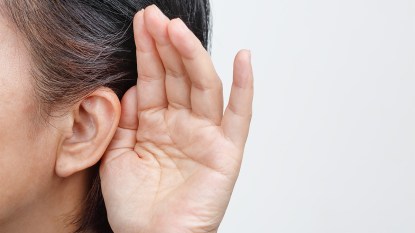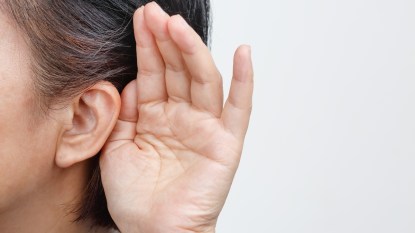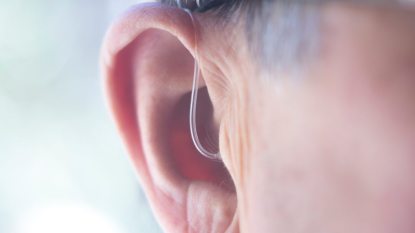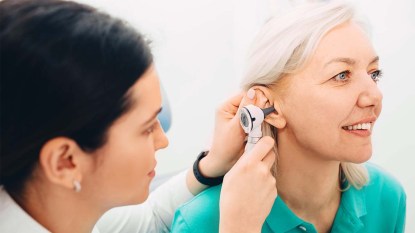Top MD Warns That Even Slight Hearing Loss Can Increase Your Risk of Dementia — 8 Natural Ways to Improve Hearing Today
It can be as easy as turning on your TV in the background!

If you find yourself turning up the volume louder than usual on your TV or phone, straining to hear in loud restaurants or asking people to repeat themselves, keep reading! Hearing loss is incredibly common as we age, leaving many women looking for ways to improve hearing. The great news is there are many simple strategies that have been proven to help.
As many as one in three people between ages 65 and 75 have some form of hearing loss for a variety of reasons, including exposure to loud noises and health conditions like diabetes. And while hearing aids can certainly help, many of us aren’t ready to take the plunge. (If you are, check out this article on our sister site to find out how to save on hearing aids.)
Why it’s vital to improve hearing
A certain amount of hearing loss is to be expected as we get older, but the more severe the impairment, the higher the risk of developing Alzheimer’s disease, according to research from Johns Hopkins University. “Hearing loss and the risk of dementia seem in proportion to each other — in other words, if one has double the hearing loss, one will probably have double the risk of dementia,” explains otologist/neurotologist Justin S. Golub, MD, associate professor, Otolaryngology-Head and Neck Surgery, New York-Presbyterian/Columbia University Irving Medical Center.
That’s largely because when we’re struggling to hear, our brain is forced to work harder on this lower-level task, instead of on higher executive functions that keep us sharp, like flexing our creativity and solving problems. Says Dr. Golub, “Part of maintaining brain health is always digesting interesting information, thinking critically and making memories. You can’t do that as well if you’re just focused on trying to pick out which words are being spoken in a conversation.”
Simple ways to improve hearing
Turn on the TV in the background
To preserve your hearing, practice chatting with someone while the TV is on low in the background. A recent Harvard study of older adults suggests that doing so helps people learn to discern specific sounds and tune out white noise, improving hearing by 25%.
Pop in earplugs before exposing ears to loud noise
While noise damage is a common cause of hearing loss, most of it can be prevented simply by using earplugs, assures Dr. Golub. Consider doing just that when you’re drying your hair in the morning, as the average blow-dryer emits a near-deafening 60 to 95 decibels, enough to cause damage over the long-term. Luckily, earplugs are shown to reduce the risk.
Indeed, dampening loud noise of any kind is the best thing you can do for your hearing, notes Dr. Golub. “Some smartphones can even tell you if the music you’re listening to on your headphones is too loud.” For Androids, download the free sound meter app; for iPhones, open the Health app and select “Hearing.” Says Dr. Golub, “You can make easy decisions like this today that will have a big impact on your hearing 20 years from now.”
Related: MD-Approved Tricks to Sharpen Hearing Naturally — No Hearing Aid Required
Cleanse ear canals with a little oil
In general, you don’t need to remove earwax, but if you experience muffled hearing, wax buildup may be to blame, says Heather Moday, MD, director of the Moday Center in Philadelphia. And removing built-up earwax makes voices sound clearer. However, she advises against trendy earwax-removing candles, which are hollow cones surrounded by wax that you place in the ear canal.
“The theory is that they heat and soften earwax, but there’s no evidence they work and they’re risky to use,” she says. “Putting anything in your ear can damage the eardrum, and a melting candle close to your face can lead to burns. (Click through to learn what dark ear wax means — and how to get rid of it.)
The safe way to remove earwax, according to Dr. Moday: Use a dropper to place 3 to 5 drops of baby oil or mineral oil in your ear to soften and loosen wax. After 24 hours, fill a bulb syringe with warm water, place a few drops in your ear, then tilt it toward your shoulder to let the oil, water and wax drain out. If this doesn’t help, your doctor can use a tool to safely remove excess wax.
Related: Ever Get an Annoying Crackling Sound in Your Ear? MD Shares the Easy Fix You Already Have on Hand
Breathe this way
If your hearing is muffled thanks to a cold, a simple breathing exercise can help, says Dr. Moday. Your eustachian tube, the small passage connecting your middle ear and throat, can clog with excess mucus from a cold, muffling hearing, she explains.
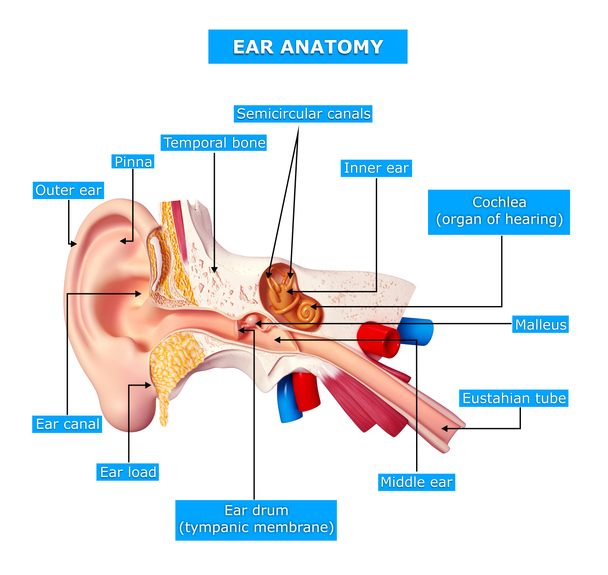
But you can prevent and treat this problem with the Buteyko breathing method. Research shows it’s more effective at keeping ears clear than medication. To do: Sit upright, exhale, plug your nose and hold your breath until you feel the urge to breathe. Breathe normally for 10 seconds, then repeat the cycle five times. The method normalizes ear pressure to prevent eustachian-tube blockages.
Try ginkgo biloba
If constant ringing or buzzing sounds (a condition known as tinnitus) make hearing difficult, taking 240 mg. of ginkgo daily could quiet that racket, suggests German research in the International Journal of Clinical Pharmacology, helping you hear 40% more clearly. The study authors explain that ginkgo is rich in compounds called glycosides that calm overactive ear nerves. Note: Check with a doctor before supplementing.
Lean in
When you’re having trouble tracking what someone is saying, try leaning in from your right side, cupping your right ear, suggests Dr. Moday. Researchers in the Journal of the Acoustical Society of America found that the strategy improves hearing by 40%. That’s because sounds that go into your right ear are processed by the left side of your brain (the side that’s best at understanding language), plus a cupped hand catches incoming sound waves and funnels them straight into that ear.
Serve up root veggies
Delicious budget-friendly carrots, potatoes, beets, and other root veggies are good for your hearing. These root vegetables brim with nutrients (potassium, manganese and vitamin C) that strengthen the tiny blood vessels that shuttle oxygen-rich blood to your inner ear, says Dr. Moday. To make the most of these gems, click through for a delicious root-vegetable stew.
Move your body
Exercise outsmarts hearing loss, say University of Florida scientists. In an animal study, they tracked mice from 6 to 24 months of age (the human equivalent of 25 to 60 years) and found that sedentary animals lost 60% of their hearing over time; mice that exercised lost only 40%. Study author Shinishi Someya, PhD, says exercise boosts blood flow to the inner ear, protecting against the loss of capillaries and sound receptor cells that dims hearing.
Click through for more stories on hearing loss:
7 Everyday Sounds That May Cause Ear Damage — And How to Prevent Hearing Loss
Expert Advice: ‘Do OTC Hearing Aids Really Work?’
Say What? New Study Finds Link Between Hearing Loss and Healthy Diet
This content is not a substitute for professional medical advice or diagnosis. Always consult your physician before pursuing any treatment plan.





